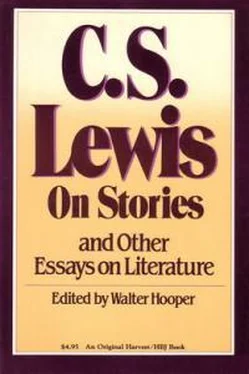On Stories
And other essays on literature
C. S. Lewis
It is astonishing how little attention critics have paid to Story considered in itself. Granted the story, the style in which it should be told, the order in which it should be disposed, and (above all) the delineation of the characters, have been abundantly discussed. But the Story itself, the series of imagined events, is nearly always passed over in silence, or else treated exclusively as affording opportunities for the delineation of character. There are indeed three notable exceptions. Aristotle in the Poetics constructed a theory of Greek tragedy which puts Story in the centre and relegates character to a strictly subordinate place. In the Middle Ages and the early Renaissance, Boccaccio and others developed an allegorical theory of Story to explain the ancient myths. And in our own time Jung and his followers have produced their doctrine of Archtypes. Apart from these three attempts the subject has been left almost untouched, and this has had a curious result. Those forms of literature in which Story exists merely as a means to something else—for example, the novel of manners where the story is there for the sake of the characters, or the criticism of social conditions—have had full justice done to them; but those forms in which everything else is there for the sake of the story have been given little serious attention. Not only have they been despised, as if they were fit only for children, but even the kind of pleasure they give has, in my opinion, been misunderstood. It is the second injustice which I am most anxious to remedy. Perhaps the pleasure of Story comes as low in the scale as modern criticism puts it. I do not think so myself, but on that point we may agree to differ. Let us, however, try to see clearly what kind of pleasure it is: or rather, what different kinds of pleasure it may be. For I suspect that a very hasty assumption has been made on this subject. I think that books which are read merely 'for the story' may be enjoyed in two very different ways. It is partly a division of books (some stories can be read only in the one spirit and some only in the other) and partly a division of readers (the same story can be read in different ways).
What finally convinced me of this distinction was a conversation which I had a few years ago with an intelligent American pupil. We were talking about the books which had delighted our boyhood. His favourite had been Fenimore Cooper whom (as it happens) I have never read. My friend described one particular scene in which the hero was half–sleeping by his bivouac fire in the woods while a Redskin with a tomahawk was silently creeping on him from behind. He remembered the breathless excitement with which he had read the passage, the agonized suspense with which he wondered whether the hero would wake up in time or not. But I, remembering the great moments in my own early reading, felt quite sure that my friend was misrepresenting his experience, and indeed leaving out the real point. Surely, surely, I thought, the sheer excitement, the suspense, was not what had kept him going back and back to Fenimore Cooper. If that were what he wanted any other 'boy's blood' would have done as well. I tried to put my thought into words. I asked him whether he were sure that he was not over–emphasizing and falsely isolating the importance of the danger simply as danger. For though I had never read Fenimore Cooper I had enjoyed other books about 'Red Indians'. And I knew that what I wanted from them was not simply 'excitement'. Dangers, of course, there must be: how else can you keep a story going? But they must (in the mood which led one to such a book) be Redskin dangers. The 'Redskinnery' was what really mattered. In such a scene as my friend had described, take away the feathers, the high cheek–bones, the whiskered trousers, substitute a pistol for a tomahawk, and what would be left? For I wanted not the momentary suspense but that whole world to which it belonged—the snow and the snow–shoes, beavers and canoes, war–paths and wigwams, and Hiawatha names. Thus I; and then came the shock. My pupil is a very clear–headed man and he saw at once what I meant and also saw how totally his imaginative life as a boy had differed from mine. He replied that he was perfectly certain that 'all that' had made no part of his pleasure. He had never cared one brass farthing for it. Indeed—and this really made me feel as if I were talking to a visitor from another planet—in so far as he had been dimly aware of 'all that', he had resented it as a distraction from the main issue. He would, if anything, have preferred to the Redskin some more ordinary danger such as a crook with a revolver.
To those whose literary experiences are at all like my own the distinction which I am trying to make between two kinds of pleasure will probably be clear enough from this one example. But to make it doubly clear I will add another. I was once taken to see a film version of King Solomon's Mines . Of its many sins—not least the introduction of a totally irrelevant young woman in shorts who accompanied the three adventurers wherever they went—only one here concerns us. At the end of Haggard's book, as everyone remembers, the heroes are awaiting death entombed in a rock chamber and surrounded by the mummified kings of that land. The maker of the film version, however, apparently thought this tame. He substituted a subterranean volcanic eruption, and then went one better by adding an earthquake. Perhaps we should not blame him. Perhaps the scene in the original was not 'cinematic' and the man was right, by the canons of his own art, in altering it. But it would have been better not to have chosen in the first place a story which could be adapted to the screen only by being ruined. Ruined, at least, for me. No doubt if sheer excitement is all you want from a story, and if increase of dangers increases excitement, then a rapidly changing series of two risks (that of being burned alive and that of being crushed to bits) would be better than the single prolonged danger of starving to death in a cave. But that is just the point. There must be a pleasure in such stories distinct from mere excitement or I should not feel that I had been cheated in being given the earthquake instead of Haggard's actual scene. What I lose is the whole sense of the deathly (quite a different thing from simple danger of death)—the cold, the silence, and the surrounding faces of the ancient, the crowned and sceptred, dead. You may, if you please, say that Rider Haggard's effect is quite as 'crude' or 'vulgar' or 'sensational' as that which the film substituted for it. I am not at present discussing that. The point is that it is extremely different. The one lays a hushing spell on the imagination; the other excites a rapid flutter of the nerves. In reading that chapter of the book curiosity or suspense about the escape of the heroes from their death–trap makes a very minor part of one's experience. The trap I remember for ever: how they got out I have long since forgotten.
It seems to me that in talking of books which are 'mere stories'—books, that is, which concern themselves principally with the imagined event and not with character or society—nearly everyone makes the assumption that 'excitement' is the only pleasure they ever give or are intended to give. Excitement , in this sense, may be defined as the alternate tension and appeasement of imagined anxiety. This is what I think untrue. In some such books, and for some readers, another factor comes in.
To put it at the very lowest, I know that something else comes in for at least one reader—myself. I must here be autobiographical for the sake of being evidential. Here is a man who has spent more hours than he cares to remember in reading romances, and received from them more pleasure perhaps than he should. I know the geography of Tormance better than that of Tellus. I have been more curious about travels from Uplands to Utterbol and from Morna Moruna to Koshtra Belorn than about those recorded in Hakluyt. Though I saw the trenches before Arras I could not now lecture on them so tactically as on the Greek wall, and Scamander and the Scaean Gate. As a social historian I am sounder on Toad Hall and the Wild Wood or the cave–dwelling Selenites or Hrothgar's court or Vortigern's than on London, Oxford, and Belfast. If to love Story is to love excitement then I ought to be the greatest lover of excitement alive. But the fact is that what is said to be the most 'exciting' novel in the world,
Читать дальше











